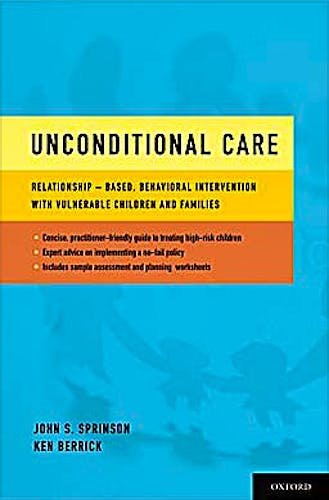

No hay productos en el carrito



Unconditional Care. Relationship-Based, Behavioral Intervention with Vulnerable Children and Families
Sprinson, J.S. — Berrick, K.
1ª Edición Febrero 2010
Inglés
Tapa blanda
304 pags
1000 gr
16 x 24 x null cm
ISBN 9780199733033
Editorial OXFORD USA
LIBRO IMPRESO
-5%
43,00 €40,85 €IVA incluido
41,35 €39,28 €IVA no incluido
Recíbelo en un plazo de
2 - 3 semanas
- Conferences we attend: SSWR, CSWE, APA2, APA, AACAP, ISTSS, BPD Conferences we don't attend: San Diego International Conference on Child & Family Maltreatment, Child Welfare League of America, American Public Human Services Association, American Professional Society on the Abuse of Children, National Staff Development & Training Association, Family Preservation Association, National Association of Social Workers Other possibilities: Treatment centers and state child welfare agencies may purchase bulk quantities for training purposes
- Concise, practitioner-friendly guide to treating high-risk children
- Expert advice on implementing a no-fail policy
- Integrates attachment and learning theories into an innovative practice model
- Includes sample assessment and planning worksheets
This clinician-friendly guide presents a model for engaging the most challenging children and families who are served by the child welfare, mental health, juvenile justice, and special educations systems. These children are among the most troubled clients that treatment providers will ever encounter. They have been failed by every adult, every treatment modality, and every system of care that they have encountered.
Unconditional Care, a breakthrough guide from the founder and clinical director of California's Seneca Center for Children and Families, offers both a theoretical model and practical guidelines for working with this most difficult group of children. The approach weaves together attachment theory and learning theory into a coherent relationship-based intervention strategy built around a no-fail policy: a child can never be discharged from a program for exhibiting the behaviors that resulted in the placement. Professionals working with these families instead focus on re-building relationships that teach children to secure safe and supportive relationships with caregivers using new behaviors and skills to replace the destructive ones that have, until now, organized their worldview. The concept of unconditional care allows, for the first time, a safe space for youth to reconstruct their perceptions of themselves and those who care for them.
Rich case examples, quick-reference bullets and boxes, and sample assessment and planning worksheets make this a handy clinical reference and training tool for mental health and child welfare professionals.
Readership: Clinicians and administrators working with children and families in residential treatment, foster care, day treatment, juvenile justice, and out-patient settings. Child welfare workers, staff and private-practice psychologists & psychiatrists, supervisors, and administrators. Students in social work, psychology and counseling programs.
AUTHOR INFORMATION
John S. Sprinson, Clinical Director, Seneca Center for Children, and Ken Berrick, Founder and CEO, Seneca Center for Children
© 2025 Axón Librería S.L.
2.149.0